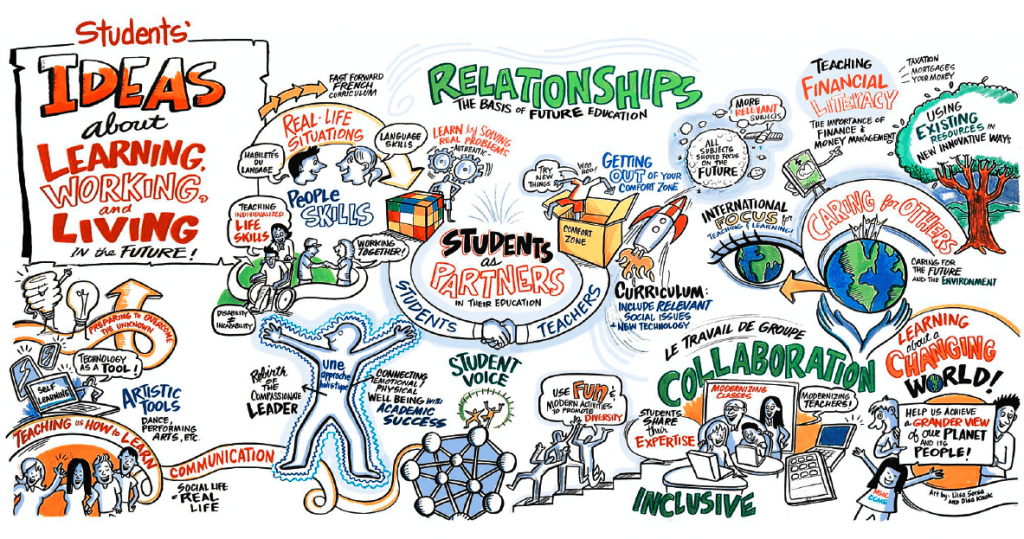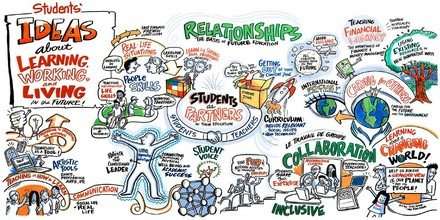This thoughtful and thought provoking essay on the future of our educational system was written by Mrs Shelley Thomas, director of Instructional and Administrative Technologies at Ridley College, Ontario, Canada. It was originally published at Mrs Thomas’s blog dedicated to v.
Education in the 21st century: service
Albert Schweitzer once said, “I don’t know what your destiny may be, but one thing I know. The only ones among you who will be really happy are those who have sought and found how to serve.”
Powerful claim.
In the age of digital immigrants, natives, and net generations, where an i-market has created an i-army of consumers and followers, perhaps the notion of healthy service has been confused with a kind of enslavement. Competition for university entrance, brand name schools, high-end results, etc., places students under enormous pressure to perform for fear of being left behind. They are in perpetual motion, running up the down escalator with no emergency stop button to let them catch their breaths, or take stock of where they’ve been or where they’re headed, or sadly, if they even want to run in that direction. The path is set for them and we tell them to run.
 In this flurry of fear and action, students think only of themselves in their contests for success. There is no time to consider others, no time for real service as someone else might pass them in the never-ending race to ‘success’. The result? The i-army is cut off from others, from the self. When ‘successes’ are achieved, they seem empty, transitory, because students have no time to reflect on them as they are pushed forward to the next escalator. There is no joy in the process; sadder still, there is no joy in the success. Achievement is fleeting and unfulfilling.
In this flurry of fear and action, students think only of themselves in their contests for success. There is no time to consider others, no time for real service as someone else might pass them in the never-ending race to ‘success’. The result? The i-army is cut off from others, from the self. When ‘successes’ are achieved, they seem empty, transitory, because students have no time to reflect on them as they are pushed forward to the next escalator. There is no joy in the process; sadder still, there is no joy in the success. Achievement is fleeting and unfulfilling.
In Schweitzer’s words, service to others is essential for one’s happiness. Schools are recognizing this imperative and applying it in new ways. They are re-thinking 21st century education in the context of service. What is more, they are inviting students to the table, to be active participants in this dialogue. /—/ What educational curriculum would not want to embrace these objectives and develop free-thinking and responsible individuals? Asked to present their version of a free-thinking and responsible curriculum, two high school students in Ontario produced the mind map below. It’s worth a look.
The syllabus for the 21st century school
must include … meditation!
Happiness and service are linked by ownership and self-determination. Students need time to think about what will be meaningful, to them. But where in our congested and frantic timetables do we provide time for this kind of reflection and meditation?
Where do we provide occasion for students to pause and reflect, breathe and wonder? To know who they are, and not who their parents, coaches, teachers, schools, media think they should be? When do we allow students time to have these vital conversations with themselves? It’s not in the curriculum. Not yet.
Nigel Barlow, at the Apple Education Leadership Institute 2012, Toronto, introduced the idea of building quiet time into the structure of the day. He recommends fifteen minutes of uninterrupted meditation, twice a day, school-wide. He cites the Visitacion Valley Middle School in San Francisco, California as an exemplar of the Transcendental Meditation Program in practice.
Fifteen minutes, twice a day, school-wide. Everyone quiet. Still with their thoughts. Recalibrating, breathing, calming down and listening to the voice within, as opposed to the pervasive and invasive voices of media, teachers, parents, and the incessant honking of horns on the information highway. As small and subtle as this shift may appear, the results indicate that reflection is critical for learning.
Students who have a voice in determining what they learn will experience the real joy in learning. That, in turn, makes our service as teachers genuine and fulfilling.















